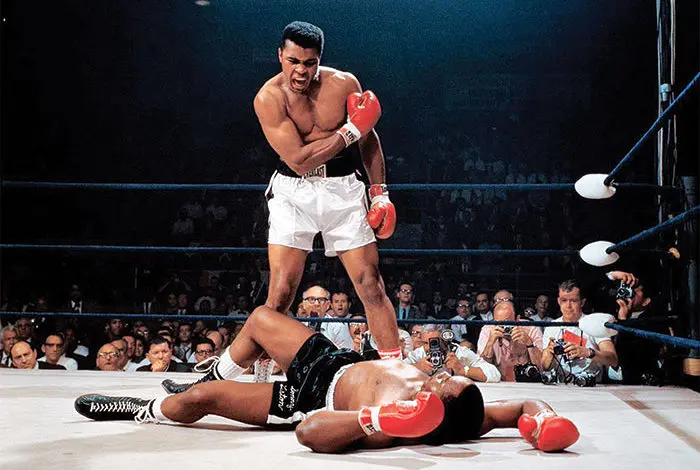
“I ain’t got no quarrel with them Viet Cong — no Viet Cong ever called me nigger.”
With those pointed words, Muhammad Ali explained his opposition to the war in Vietnam and justified his refusal to submit himself to the draft. He declared himself a conscientious objector. After declining three times to step forward for induction into the Armed Forces in April of 1967 in Houston, Texas, the reigning world heavyweight boxing champion was arrested, stripped of his title and state boxing licenses and thrown into a three-year legal battle ending with his exoneration (on technical grounds) by the US Supreme Court.
No one ever seriously doubted the physical courage of Muhammed Ali (born Cassius Marcellus Clay, Jr. in 1942 in Louisville, Kentucky). An Olympic gold medalist and winner of eight Golden Gloves titles, he became the youngest man ever to unseat a reigning heavyweight boxing champion at 22.
Clay, named after a Kentucky planter who became a crusader for the abolition of slavery, converted to Islam and changed his name shortly after that 1964 technical knockout victory over Sonny Liston. He was fearless in the ring (perhaps forever “the greatest”, as he called himself and came to be called by others). He went on to become professional heavyweight boxing’s only three-time world champion, winning the title in 1964, 1974 and 1978.
But his singular act of MORAL courage — a prominent Black American at the pinnacle of youthful fame, standing
firm against an immoral war in the face of disapproval from World War II’s “Greatest Generation,” head unbowed to forced military service more than a century after his nation put an end to formal
chattel slavery — remains by far his greatest legacy.
His stand rang the opening bell on a generation’s resistance to war and conscription and inspired Martin Luther King, Jr., who had hesitated to oppose civil rights supporter Lyndon Baines Johnson on the subject, to come out against the war in Vietnam.
Nor did Ali’s peace activism end with his draft resistance. In 1991, he traveled to Iraq to negotiate with Saddam Hussein for the release of American hostages, and in 2002 he visited Afghanistan as a “UN Messenger of Peace.” The Ali Center established the Muhammad Ali Humanitarian Awards in 2013 to honor those who make “significant contributions toward securing peace, social justice, human rights and/or social capital in their communities and on a global basis.”
Muhammad Ali died on June 3, in Scottsdale, Arizona. He was 74.






Leave a Reply